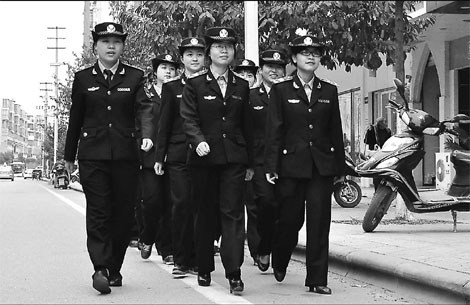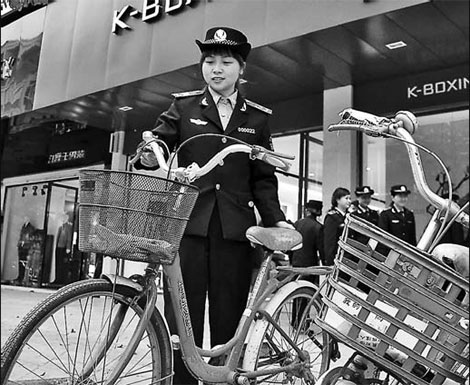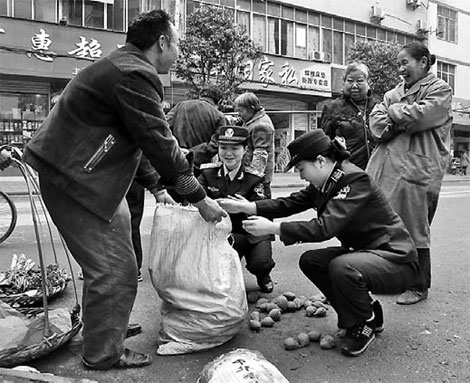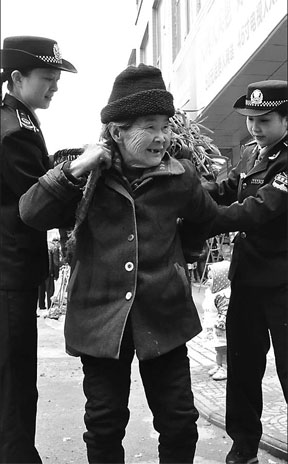The gentle persuaders
Updated: 2012-04-29 07:04
By Huang Zhiling(China Daily)
|
|||||||
|
Female urban management officers patrol the streets in Yilong, Sichuan province, in March. Zhang Bin / For China Daily |
|
An urban management officer puts bicycles in order on a street in Yilong earlier this year. Zhang Bin / For China Daily |
|
Officers in Yilong help street vendors remove their stalls and produce from the street. Zhang Bin / For China Daily |
The soft approach is often better in a tough job, Huang Zhiling reports in Yilong, Sichuan province.
Taking a stroll along the street one day, Zhang Wenmin bumped into someone who before long was clasping her hands and chatting away as if they were long lost friends.
"It was only after several minutes that I understood the 60-year-old was the mother of a vendor selling fruit," says Zhang, 25, an urban management officer in Yilong, a remote, mountainous county in Sichuan province.
The vendor, in his 30s, was selling oranges on a tricycle at the entrance to a produce market, blocking traffic and pedestrians.
Whenever she sees the vendor, Zhang politely asks him to do business inside the market.
|
Urban management officers help an old lady with her vegetables after they persuaded her to move her stall from the street to an open market in Yilong in March. Zhang Bin / For China Daily |
The vendor's mother, Wu Min, tells China Daily: "Although I have never met Zhang Wenmin before, my son has said many times that she is a very nice officer, unlike others he has come across."
Zhang is one of 18 female officers from different parts of Sichuan who have worked on the streets of Yilong since November, after passing the national recruitment exam for public servants.
More than 2,500 people competed for 32 vacancies in the county's urban management bureau, whose 18 officers were all men. Because most of the successful candidates were women, the bureau set up a separate team.
Their duty is to ensure vendors selling vegetables and fruit do not block roads, and that drivers park in the allocated places. But sometimes the officers have more than people to contend with.
"Sometimes we have to drag animals out of the way," says Li Xia, 33, a female officer.
Li tells the story of 15 female officers working together with nearly 30 of their male counterparts to pull more than 20 oxen from a wetland park last month.
Several ox sellers took the animals to the park, built at a cost of tens of millions of yuan, so they could feed on grass. When the officers arrived at the park, not a single dealer was there. "Because we lacked experience, we spent an entire day getting the oxen to go to a car park four kilometers away," she says. "Our hands were aching."
But to the female officers, it is more difficult to persuade hawkers not to block a road than to get oxen to go where you want them to.
One vegetable seller whom Qin Yuan has dealings with always blocks traffic, then takes off, promising not to return. "But she's always at it again the next day, doing the same thing," says Qin, 24, who studied animation at China West Normal University in Nanchong, a city under whose jurisdiction Yilong falls.
In her spare time, Qin draws cartoons depicting the relationship between vendors and officers.
In December, she found an old resident in his 70s selling vegetables outside a market. After the man blocking the road refused to leave or go inside to do business, Qin fell back to the gentle approach. Calling him "granddad", she proceeded to give him a back massage.
"I told him, 'You're as old as my granddad, and I'm so sorry you have to work so hard to earn a living. But as a granddad, I don't think you want to make trouble for your 'granddaughter'. The man calmed down and left."
The vendors sometimes swear at the officers, or even hit them, if they are ordered to stop hawking vegetables or fruit.
"We're always being sworn at," Li says. "But we never lose our temper. Otherwise, passersby who are sympathetic to the poor would join with them in giving us a piece of their mind."
Last month an unlicensed barbecue stall appeared near a high school. When Li and other officers asked him to leave, threatening to confiscate his stall, about 200 students surrounded them, showing solidarity with the stallholder.
"They left only when their class was about to resume," Li says.

Unlike their older male counterparts, the 18 women, whose average age is 25, have all attended college. Some were secretaries in companies or were magazine editors. They chose to work as officers because it gives them permanent-job status and the benefits of being a public servant, even if none of them come from Yilong.
But quite a few see the job of urban management officer as a lowly calling, bereft of any honor. For them the mere mention of the term "urban management officer", or chengguan, conjures up the image of uneducated men bullying the disadvantaged.
"The first day when I worked, I tore off my badge," Zhang says.
She has slowly accustomed herself to the job and passed the national graduate record examination this year. In the autumn, she will start pursuing her master of public administration degree on weekends at China West Normal University.
Many female officers are said to have no boyfriends because of the physical demands of their work.
After walking all day they only want to sleep after work and have no time to chat on the Internet.
"All those who have boyfriends had them before they became officers," Qin says.
Apart from sleeping, the female officers like sharing supper in their rented apartments.
"By dining together we can forget about the bad feelings from being poorly treated at work," says Li, whose husband and 5-year-old son live in Nanchong, about 80 km away.
And they dare not buy vegetables or meat from the market where they work. "When we buy, vendors would offer to give us food free of charge," says Wan Ting, an officer. "They would try to bribe us so that we would not stop them from occupying the road."
Contact the writer at huangzhiling@chinadaily.com.cn
(China Daily 04/29/2012 page8)



